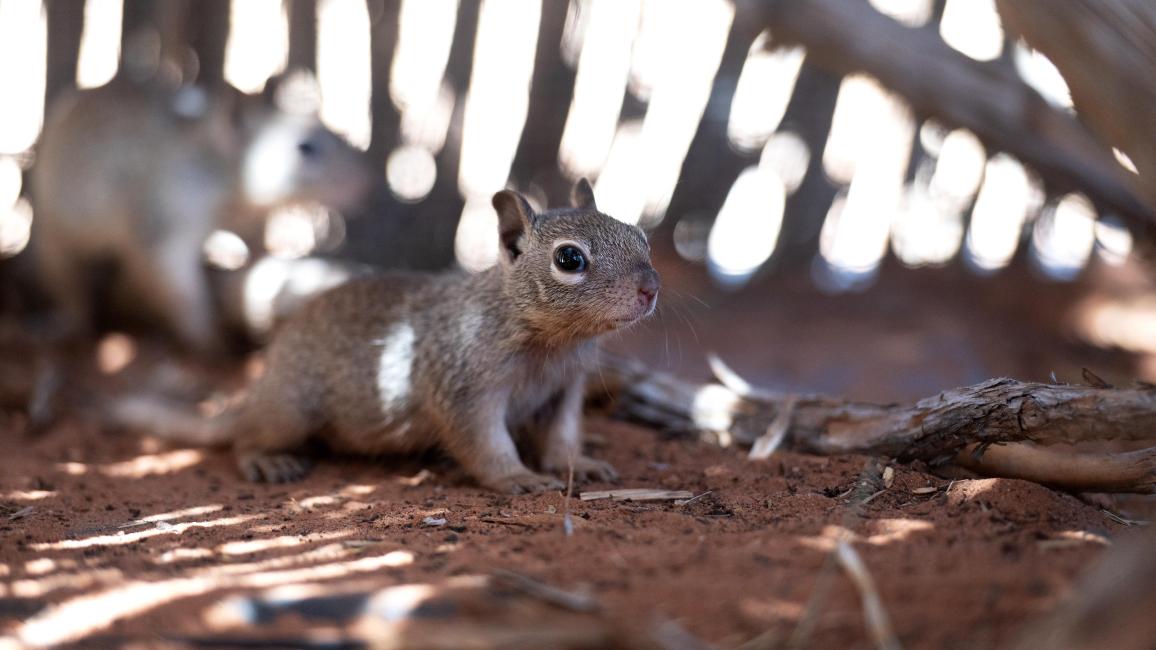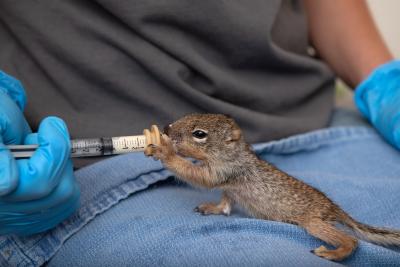These baby animals were born to be wild

Baby season at Best Friends Animal Sanctuary isn’t limited to just kittens, puppies and other pets. The local wildlife is also in full-baby bloom. While, ideally, all newborns and hatchlings would stay with their families until they’re big enough to set out on their own, sometimes accidents happen that leave them stranded, abandoned or orphaned. That is where licensed wildlife rehabilitators come in.
At Wild Friends, the Sanctuary’s state and federally licensed wildlife rehabilitation center, the rehab team (Corinne Blossfeld, Lauren Ross and Christopher Orpurt) has been busy with all sorts of wild babies in need of help. Each one has individual care and feeding needs that require a practiced hand to ensure they grow up healthy, happy and (most important of all) wild. As adorable as they may be, these babies were born to live free in the great outdoors, which is the goal for every wild friend arriving at the Sanctuary.
Lauren has been keeping followers of the Wild Friends Facebook page updated on the little ones’ roads to recovery, but in case you missed them, here are some of our favorites. And remember: If you find a wild animal you believe to be injured or orphaned, please contact your local licensed wildlife rehabilitator right away so they have the best chance of recovering and returning to their wild home.
Hungry, hungry hummingbirds
Did you know hummingbirds don’t just live on nectar from flowers? They also eat a lot of little bugs for protein. So, our hummingbird formula is a special mix of proteins, sugars, vitamins and calcium to help the babies grow into healthy adults. We use a different formula for each stage of their lives to make sure they are getting all they need.
They also need specialized care. Since their metabolisms are so fast, hummingbirds need to be fed every 15 minutes. And once they’re eating on their own, they need to be watched closely to make sure they are eating enough to sustain themselves.
These little cuties either tried to leave the nest too soon or were blown out of their nest by the recent heavy winds in southern Utah. They were found sitting near each other in the middle of the road, and with how tiny they are, they are lucky someone spotted them. These two, who were very quick to learn to eat on their own, have since been released. Good luck little guys.
Grounded goldfinch
This little baby was found on the ground after falling out of the nest, and the finder, with the best of intentions, planned to raise him on his own and called our rehab center for advice. We kindly informed him that it was illegal to take in injured or orphaned wildlife unless you are a licensed rehabber, and that the best course of action — if he could locate the little one — would be to put him back in the nest.
He believed, as most of us are taught, that if you touch a baby animal the mom will reject it. This is a myth: The mom will not abandon a baby if you touch and then renest a baby. Some mammal species have multiple nests or dens. They may move the babies to a different spot, but they will not abandon them. Birds don't rely much on their sense of smell and don’t really notice if you renest the baby. They will come back almost immediately. Unfortunately, this baby was a rather long distance away from where he was found, so he was brought to the Sanctuary.
The formula we use for goldfinches is very different from the formula used for the more common house finch, which includes a very different feeding method. These very delicate birds, when found, must be taken to a licensed wildlife rehabilitation center so that they have the best chance of returning to the wild where they belong — just like this little fellow did.
Misplaced mourning dove
This young bird was caught by a dog after falling out his nest, and his finder immediately got him to our licensed rehabilitators.
Feeding a dove is tricky because in order to avoid aspiration the food must go directly into the crop, a special pouch in a bird’s throat where food is stored prior to digestion. With careful training, though, our rehabbers knew just what was needed to get this dove safely fed, warm and on proper medication.
If your pooch snatches something, it's always a good idea to call your closest rehabber, even if you don't see any injuries because there might be internal damage. Luckily, thanks to the quick work of our rehabbers, this little fledgling was soon on the road to recovery. And it wasn’t long before he was strong enough to fly off into the sunset along with a few other rehabilitated young doves.
Rocky start for rock squirrels

This small squirrel, along with his siblings, was found by a woman who, sadly, saw their momma get hit by a car. When the babies came out of their burrow looking for their mom, the woman called Wild Friends rehabilitators for advice, and we told her to bring them in.
The burrow was under her porch, so she was able to keep a close eye on it. The next day, two more came out, both dehydrated and covered with fleas. But we were able to clean and rehydrate them and within a few days even the tiniest one was quickly gaining weight.
Once they were big enough, they graduated to an outdoor enclosure and became completely hands-off, so they could learn how to forage on their own and develop a healthy fear of humans and predators — a must for living safely in the wild. When the day came for them to be released, they were off in a flash, scampering away to the safety of the underbrush.
Help more animals go home
Wild babies in rehabilitation or pets looking for new families, they often need our help. By joining Best Friends, you can support them on their road home.
Read more
Birds, bunnies and snakes, oh my: 8 wild animal rescue stories